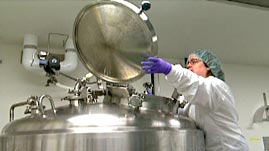Teachers' Domain - Digital Media for the Classroom and Professional Development
User: Preview


Source: Pathways to Technology: "Success Story: Suzanne Pooler"
In this video excerpt from Pathways to Technology, meet Suzanne Pooler, a biotechnology production support associate, whose work contributes to cancer treatment. As a production support associate, Suzanne supports scientists' research by keeping cancer cells alive in test tubes. Without the right environment and nourishment, the cells would die and the research would have to start over. Suzanne discusses why she left her old job as an administrative assistant to attend community college and study science. She also explains why she loves her new job working in the field of biotechnology.
When you think about finding a cure for cancer, do you picture scientists working alone in labs, filling test tubes, and making notes? Think again. There are many links in the chain of people working to beat cancer, and a biotechnology production support associate is one of them.
That’s Suzanne Pooler’s job at EMD Pharmaceuticals. “We’re trying to produce drugs that will treat cancer,” she explains. “I am responsible for mixing the product that the cells will live in and feed off of.” The healthy cells and cancer cells that scientists study must be kept alive outside a body, and creating the right environment, or product, for them to live in is crucial. If the product is not mixed correctly, the cells will die, and all the scientists’ hard work will be lost.
Suzanne wasn’t always employed in biotechnology. “I worked at various companies as an administrative assistant, over the course of about 20 years,” she says. “I was really good at what I did, but it wasn’t fulfilling; I needed more. I wanted to go to community college to explore some of my interests."
Suzanne isn’t sure where her career will take her next, but she knows she will remain in biotechnology. “To be a part of the quest for cancer treatments or cures; it’s a challenge, it’s a puzzle to solve, and it’s fascinating,” she says. “There’s so much good that can come of this process, and I’m learning a lot, and that’s always a plus.”
 Loading Standards
Loading Standards